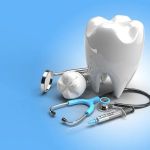How Often Should You Visit the Dentist?
When it comes to oral health, many people only think about visiting the dentist when something feels wrong. Perhaps you've experienced a painful toothache, or noticed that your gums are bleeding, and that prompts you to schedule a visit. However, regular dental checkups are much more important than reacting to problems after they occur. As someone who's had their fair share of dental experiences, I can confidently say that keeping a consistent schedule with your dentist is one of the best ways to prevent future issues and maintain your overall health.
1. The Importance of Regular Dental Visits
Visiting the dentist regularly plays a crucial role in preventing serious dental problems down the road. While brushing and flossing at home are vital for maintaining good oral hygiene, they cannot remove all of the plaque and tartar buildup that naturally accumulates on your teeth. Dentists have the tools, expertise, and professional-grade cleaning equipment to thoroughly clean your teeth, removing any buildup that could lead to cavities, gum disease, or other oral health issues.
Regular checkups also help identify problems early. For example, a dentist might spot early signs of tooth decay, cavities, or even oral cancer—issues that may not be visible to the untrained eye. Early intervention can often save you from more complex and expensive treatments in the future.
2. The General Recommendation: Every Six Months
The American Dental Association (ADA) recommends visiting the dentist at least once every six months for a routine checkup and cleaning. This is generally considered the optimal schedule for most people. These semi-annual visits allow your dentist to monitor your oral health and catch any issues before they become bigger problems.
While six months is the standard recommendation, it may not apply to everyone. Some individuals may need to visit the dentist more frequently, especially if they are at higher risk for certain oral health problems. Your dentist will be able to adjust the frequency of your visits based on your unique needs.
3. Who Needs to Visit the Dentist More Frequently?
Although the six-month rule is a good baseline, some people need to visit the dentist more frequently than others. For example, people with conditions such as gum disease, diabetes, or a history of cavities may need more frequent checkups to keep their teeth and gums healthy. Similarly, if you are prone to plaque buildup or have a history of dental problems, your dentist may recommend quarterly or three-month visits.
For people with braces, dental implants, or other dental appliances, it’s often necessary to visit the dentist every three to four months. These visits ensure that your appliances are functioning properly and that you’re maintaining good oral hygiene despite the additional challenges these devices may present.
4. What Happens During a Routine Dental Visit?
A typical dental visit usually involves two main parts: a thorough cleaning and a detailed examination.
Cleaning: During the cleaning process, your dentist or dental hygienist will remove any plaque and tartar that has built up on your teeth. They will also polish your teeth, leaving them feeling fresh and smooth.
Examination: After the cleaning, your dentist will examine your mouth, looking for any signs of cavities, gum disease, oral cancer, or other issues. They may also take X-rays to get a closer look at the health of your teeth and gums beneath the surface.
Based on this examination, your dentist may recommend additional treatments, such as fluoride treatments, fillings, or other preventive care, to keep your oral health in top shape.
5. How Dental Visits Benefit Your Overall Health
Oral health isn’t just about your teeth and gums—it's also closely linked to your overall well-being. Numerous studies have shown that poor oral health can contribute to systemic health problems, such as heart disease, diabetes, and respiratory issues. By maintaining regular dental visits, you're not only caring for your smile but also taking important steps to safeguard your overall health.
For example, untreated gum disease has been linked to an increased risk of heart disease, as the bacteria in the mouth can enter the bloodstream and contribute to the formation of blood clots. Maintaining healthy gums through regular dental visits can significantly reduce your risk of these health complications.
6. Can I Skip Dental Checkups if I Feel Fine?
It’s a common misconception that if you aren’t experiencing any pain or visible problems, you can skip dental checkups. The truth is, many dental issues—like cavities, gum disease, or early-stage oral cancer—don’t cause immediate symptoms. That’s why routine visits are so important: they allow your dentist to catch these issues before they turn into something more serious.
By neglecting regular checkups, you may be setting yourself up for future complications that could have been avoided with a proactive approach. Even if you feel fine, visiting the dentist regularly is one of the best ways to ensure your smile stays healthy for years to come.
7. What Should I Do If I Can’t Afford Regular Visits?
If cost is a concern, there are several options available to ensure that you still receive the necessary care. Many dental offices offer payment plans, sliding scale fees based on income, or can direct you to low-cost or community dental clinics in your area. Additionally, if you have dental insurance, it’s important to take full advantage of the benefits available to you, as many plans cover the cost of regular checkups and cleanings.
For those without insurance, there are also dental discount plans available, which provide reduced rates on dental services at participating offices. It’s always worth exploring all your options to ensure that financial barriers don’t prevent you from maintaining your oral health.
8. Conclusion: Prioritizing Your Oral Health
Regular dental visits are crucial for maintaining optimal oral health. By visiting your dentist every six months, or more frequently if necessary, you can prevent serious dental issues, save money on future treatments, and ensure that your overall health stays in check. If it’s been a while since your last checkup, don’t wait any longer—schedule an appointment with your dentist today and take the first step towards a healthier, brighter smile.
OLD Keywords-8:SEO Title: How Often Should You Visit the Dentist for Optimal Oral Health?SEO Keywords: dentist visits, oral health, dental checkups, dental hygiene, regular checkups, dental careSEO Description: Learn how often you should visit the dentist for optimal oral health. Discover the benefits of regular checkups, and why they are essential for preventing serious dental issues.






 MGK Dental0.0 (0 review)
MGK Dental0.0 (0 review) Pearl River Family Dentistry5.0 (104 review)
Pearl River Family Dentistry5.0 (104 review) EON Clinics4.0 (24 review)
EON Clinics4.0 (24 review) Dr. Brock F. Tekin, DMD4.0 (169 review)
Dr. Brock F. Tekin, DMD4.0 (169 review) Cooper Family and cosmetic Dentistry4.0 (224 review)
Cooper Family and cosmetic Dentistry4.0 (224 review) Woodlawn Dental Gallery4.0 (537 review)
Woodlawn Dental Gallery4.0 (537 review) The Importance of Oral Health Education During Pregnancy for a Healthy Pregnancy
The Importance of Oral Health Education During Pregnancy for a Healthy Pregnancy Best Tips for Brushing Your Teeth Properly for Healthy Gums: Essential Techniques for Oral Health
Best Tips for Brushing Your Teeth Properly for Healthy Gums: Essential Techniques for Oral Health Why Skipping Dental Checkups Can Lead to Bigger Oral Health Problems
Why Skipping Dental Checkups Can Lead to Bigger Oral Health Problems Advantages of Porcelain Dental Restorations
Advantages of Porcelain Dental Restorations How Can Diabetes Cause Tooth and Gum Problems? Preventing and Managing Oral Health Issues
How Can Diabetes Cause Tooth and Gum Problems? Preventing and Managing Oral Health Issues Healthy Habits for Promoting Good Oral Health and Hygiene: Tips for a Healthy Smile
Healthy Habits for Promoting Good Oral Health and Hygiene: Tips for a Healthy Smile